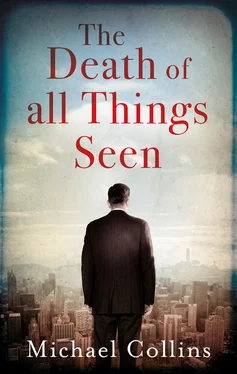Ursula spoke of it. It was preserved in the oral history, the demise of the great Chinook spawn along the Saint Lawrence, a lifecycle disturbed by the presence of outsiders. It was carried with the natives, the memory of fish, in song and story.
What you had to do, in your most solemn appeal, was pray to the wolf, the bear and the eagle, seek alternatives, abstain and let a species recover. In so doing, you nourished the inner spirit, humanity following nature, and not the other way around, for it was not mankind who first uncovered the ice bridges and the vast new interiors, but the vast herds. The tribes simply followed. This was a great lesson forgotten.
Ursula talked of the First Nations people who bore witness along the Saint Lawrence, in the aftermath of the demise of the salmon, to the arrival of a great spawn of a new human misery, the portal, wide-eyed coffin ships, unloading a grim discharge of Europe’s flotsam. The Irish, most notably, those awful, pale-faced, skeletal wretches, ragged in the embattled way salmon rushed headlong against the current in a death run for the spawning grounds to seed the next generation.
The deplorable famine ships, still remembered in legend, blighted with cholera and typhus, all stopped short of Quebec, at the outpost quarantine of Grosse-Île, so it was wondered among the First Nations people what this Europe of Kings and Queens was like that undertakings so perilous were embarked upon. It was thus understood that all things migrated along a route, a life meridian, first the fish and then the people, sharing a same history, or so Ursula believed.
*
In their time, toward the end, as Ursula faded, Nate added remote and distant histories. He ordered a history book of Canada, traveled to town for a brief reprieve. He stood in the cold vestibule of the post office. The books arrived wrapped in a crinkle of brown paper.
Ursula was taken by the story of the Basque whalers — the Basque, who throughout the sixteenth century had sailed along the Americas, fishermen more intent on concealing their hunting territory than claiming land.
In between the facts of the nautical coordinates, in the margins of the book was a sketch and tale of a fisherman who hauled up a three-foot-long cod, common enough at the time. What was astonishing, the cod spoke an unknown language. It spoke Basque.
Ursula drowsed and woke again, Nate, mindful, covering a history again, in the way a bedtime story was told time and again for its cadence as much as its details, where all strands led to the liminal depths of sleep, where there was no differentiation between fact and fiction, and all was a sound.
Nate read the account slowly, this history of exploration, surreptitiously and only recently uncovered in the archives of legal documents in a Lisbon library, when it had been there all along. There were, he told her, doctoral candidates, modern scribes who earned little, but who set themselves apart from ordinary concerns. In this instance, a doctoral candidate had uncovered legal documents concerning reparation for a ship lost some five centuries past in a place that was deciphered, from scant and purposefully hidden details, to be along the Labrador coast. Upon investigating these old parchments, a whaling galleon was discovered submerged in Red Bay, in a harbor deep enough that the inhabitants had sailed over the ruins for centuries, unaware of its presence or what had come before.
Ursula ran her fingers over the images and words, the Basques in the grey swell and kick-up of whitecaps, harpoons at the ready, and, a page later, the dead-eyed whale, pinioned and hoisted, belayed to the side of the whaler, in advance of the quiver and shudder of blubber flensed, the content of a belly let spill in a great effulgence of its precious oil.
This, Ursula, believed, was how you lived. She did not shudder from the hunt in the way the environmentalists would have. Their interests were divergent.
*
Ursula would not have made a very good witness in court, not when she held such opinions, and she might better have been embossed on the back of a coin with a papoose, and not set before the courts to topple the growing opinion of her resuscitated, noble people.
She was a contradiction, or the others made her into a contradiction, when life was more complicated. She was on the Organics logo. It defined her in a way neither she nor Nate understood it would. Nate could be charged with conjuring this innocence, capturing her so, but it was done out of genuine love, in a moment of apprehending her, a literal moment in time, so he could be forgiven. Ursula had forgiven him. She cherished what he saw in her. But it was also why the business had succeeded, because of her image, captured in the honesty in which Nate had come upon her so long ago. It was their shared truth, uncomplicated.
People corrupted it, tied it to all manner of opinions and ways of organizing a life. She was the essence of a Truth others sought, but did not fully understand, so she was a fraud, too, for knowing this, and letting it perpetuate, for letting her hair grow longer than it might, for being perhaps more native than she might have been.
She had become trapped in an idea of the idea of what she represented. She saw the image of herself as the image of one staring into a stream, and never seeing the actual self, when even that explanation was too native, too given to nativism and primitivism.
They got rich. That was the essence of what befell them, if befell was a word you might assign to becoming rich.
They were, in the end, trying to recuperate a hidden and remote Truth known only to them, and not to their daughter, who grew to hate the wild, rejecting the silhouetted figure of her mother, a silhouette that grew to resemble her, so she hated it more and more.
What Ursula said of her daughter was that she had suffered from a lack of love. In certain bonds, a child could feel a loss from the strength of a union unavailable to her. It was so with Ursula and Nate.
Ursula spoke at times of how a mother in the wild will risk her life, give of her sustenance to an offspring, but, at a certain point, the bond dissolves, and the yearling leaves, or the mother eventually drives it away.
It happened with their daughter. She did not figure in their lives. She was committed to the fundamentalism of her Pakistani husband, but it reflected, in a way, Ursula’s mania, her reach for someone beyond the immediate tribe of her own. There were, Ursula said, discontented Eves among the tribes, women who bore the seed of nations and took up with other tribes.
She had done so with Nate. Every generation had such daughters, and they made the world a magical place of convergence; they bridged the divide between tribes.
It consoled Nate to a point. It made Ursula angry that Nate saw, in her death, an end to all that they had shared. She pulled at him and insisted he not forget her. She could hear him always if he had the strength to listen and hear her.
*
Ursula’s death took a long time. Nate made the mushroom recipe as he was instructed. She had been to the other side. They were making ready her arrival. It was not her deciding, when to leave, but theirs alone above, so she waited.
Her heart rose in her chest and lines formed on her face in the sudden consternation that she had deserved none of it, the good fortune. She never thought she would die rich. It troubled her suddenly. What good was money, what did it represent in the way you might leave something woven, a blanket or a basket behind that might be used and be a touchstone to your craft and skill?
She was not angry with Nate, but something was lost, something to her and him, and to a generation. She might have gone further north. It was determined she would have, if it were presented again, her life as an eagle or a wolf. Too many years had been lost somehow. She was the logo and not the person, and she had let that happen, her alone.
Читать дальше












